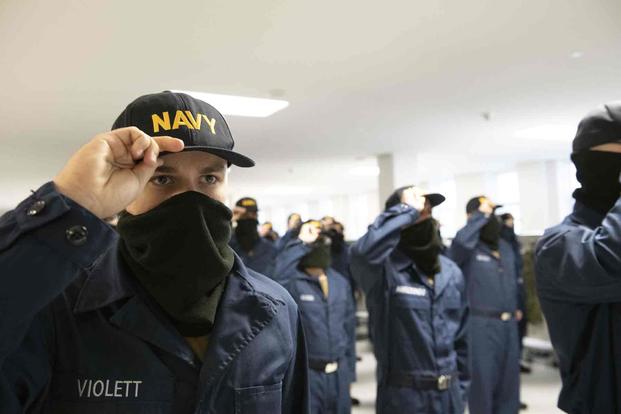The Navy's personnel boss is touting the service’s latest policy shift dropping the requirement that applicants have a high school diploma or GED certificate, a move aimed at getting more sailors in uniform amid a recruiting crisis.
Vice Adm. Rick Cheeseman, in an interview with Military.com on Wednesday, said the change has long been in the works and is about offering Americans opportunities as much as it is about boosting recruiting numbers. The service said Jan. 26 that applicants with Armed Forces Qualification Test, or AFQT, scores of 50 or higher who do not have a diploma can still enlist.
Since the policy's rollout, officials have bristled and pushed back against the idea that the change is a lowering of standards, and have pointed to both data and anecdotes to back up the assertion that, while the service is broadening the scope of who it considers eligible for enlistment, those decisions are not weakening the Navy.
"The Navy is a different place than it has been in the past, and we know through data that your education credential may not be the front and center thing that predicts your success in the Navy," Cheeseman said.
The admiral also stressed that potential recruits who join without a diploma need to score 50 or higher -- a result that normally makes them "available for technical ratings" -- on the entrance exam.
"We're talking highly qualified people when it comes to the AFQT, and we didn't think that the education credential should stop them from having this opportunity," Cheeseman said. Other officials also noted that academics are not the only reason that people leave high school before graduating.
The hope is that the change will lead to a few thousand more possible recruits. In 2023, Cheeseman said that the Navy had 2,442 people walk into a recruiting station with no formal education credentials.
"I'm hoping that 2,442 people got phone calls over the weekend and they're scheduled to take tests," he said.
The move comes just over a year since the Navy made a few other major changes to its recruiting parameters. In November 2022, the sea service said it would take recruits as old as 41. A couple of months later, the Navy also announced it would also take recruits who score between 10 and 30 on the AFQT, provided they still qualify for a rate based on the narrower topic scores.
Cheeseman now says the data vindicates the changes because more recruits than usual are making it through boot camp and moving on to their specialty schools.
The admiral pointed out that, over the last seven years, the average recruit dropout rate at the Navy's boot camp was about 15%. However, last year's rate, according to data provided by his office, was only 9.8%.
Among the Category IV recruits -- the term for the low-scoring recruits the Navy started accepting in December 2022 -- the total drop rate for the year was 11.4%.
"We're building trust in the Navy from the minute they hit the recruiting station. They go through [military entrance processing], they get up to boot camp -- it is a shock to the system still -- but they get to boot camp and they can see immediately what we're investing in them as people," Cheeseman said.
The admiral did concede that there is a "risk" associated with the policy, but he sees it as "minimal."
This is not the first time the Navy has allowed recruits to join without high school diplomas -- they did so for a time up to the year 2000 -- and it is not the first service to flirt with the idea more recently.
In June 2022, the Army, which has also been struggling to meet its recruiting totals, dropped the education credential requirement while also asking recruits to score a 50 or higher on the AFQT. The policy lasted a week before the Army reversed course, citing pushback in the media and online.
Cheeseman wouldn't comment on the Army but noted that he and his office have been working on the Navy policy on education credentials for almost a year and got buy-in not only from recruiters but the service's top leaders and Congress.
"We've done a lot of grunt work, for lack of a better term, to make sure people understood we were looking to do this," the admiral said.
Meanwhile, the reaction on LinkedIn, the professionally oriented social media site, has been largely positive, with many sailors reacting to the announcement from Cheeseman by sharing their family or personal stories of joining the Navy, and succeeding despite having a diploma.
"I was buoyed by those comments," Cheeseman said. "We're trying to make a positive effect on people's lives -- yes, we have a mission to meet -- but impacting Americans is pretty damn important, too."
Related: The Navy's Personnel Boss Is Confident Data Can Fix the Service's Recruiting Woes











